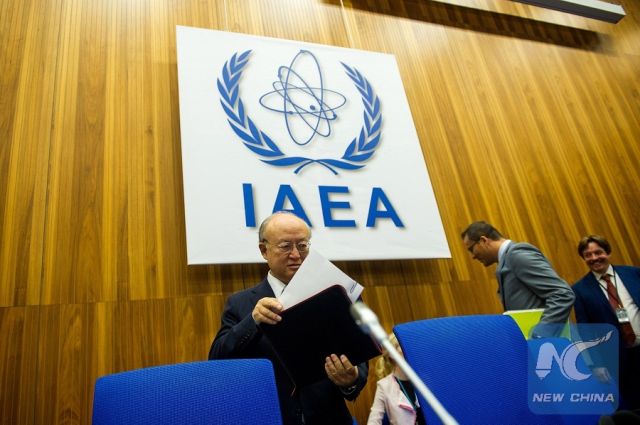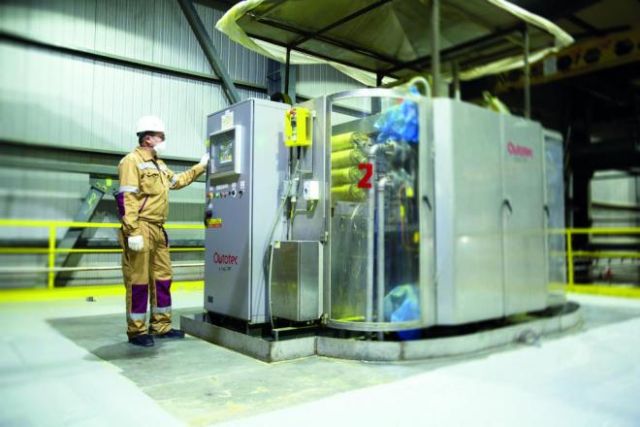
by admin | May 25, 2021 | Muslim World

IAEA chief Yukiya Amano
Vienna : The International Atomic Energy Agency (IAEA) on Thursday confirmed that Iran is sticking to the 2015 nuclear accord.
In a report of IAEA chief Yukiya Amano to a board meeting in Vienna, the capital of Austria, the agency said that under the monitor of IAEA, Iran is still complying with the Iranian nuclear accord reached in July 2015, Xinhua reported.
“Iran is implementing its nuclear-related commitments under the Joint Comprehensive Plan of Action (nuclear deal). It is essential that Iran continues to fully implement those commitments,” said the report.
IAEA plays a key role in monitoring the implementation of the Iranian nuclear deal, under which, Iran agreed to significantly scale back its nuclear plan, giving more transparency of its atomic plan to the international society, in return, the related international sanctions are to be lifted.
However, Washington withdrew from the landmark nuclear deal in May, and imposed second batch of sanctions against Tehran in early November, targeting Iran’s shipping, financial and energy sectors.
Tehran has dismissed US sanctions’ pressures, saying that it will continue its “constructive role” concerning regional policies.
—IANS

by admin | May 25, 2021 | Muslim World
 Tehran : The International Atomic Energy Agency (IAEA) recently inspected an Iranian university, Science Minister Mansour Gholami said on Wednesday.
Tehran : The International Atomic Energy Agency (IAEA) recently inspected an Iranian university, Science Minister Mansour Gholami said on Wednesday.
Iran’s Supreme National Security Council had authorized the inspection, Gholami was quoted as saying by Tasnim news agency.
He denounced the claims that such visits damage national interests, saying that the inspections by the IAEA did not go any further than “visiting the laboratories” and it was not followed by any problems.
On Monday, reports said that the IAEA inspectors visited Iran University of Science and Technology, and Sharif University of Technology.
The IAEA is monitoring Iran’s nuclear plan under the Joint Comprehensive Plan of Action (JCPOA). Under the plan, Iran agreed to implement the Additional Protocol to the Non-Proliferation Treaty.
In July 2015, six world powers and Iran signed the JCPOA, a landmark deal that eased sanctions on Iran in exchange for Tehran limiting its nuclear programme.
—IANS

by admin | May 25, 2021 | Muslim World
 Vienna : The UN nuclear agency has reiterated that no evidence was found in Iran relevant to the development of a nuclear explosive device after 2009.
Vienna : The UN nuclear agency has reiterated that no evidence was found in Iran relevant to the development of a nuclear explosive device after 2009.
“The same report stated that the Agency had no credible indications of activities in Iran relevant to the development of a nuclear explosive device after 2009,” said the International Atomic Energy Agency (IAEA) in a statement on Tuesday about Iranian nuclear issue, saying that its consideration of this issue was closed, Xinhua reported.
The statement came after Israeli Prime Minister Benjamin Netanyahu, in a televised presentation on Monday, disclosed files allegedly obtained by Israel’s intelligence agency from Iran’s “secret nuclear archive,” saying the files prove Iran has secretly worked on nuclear weapons.
On Tuesday, Iranian Foreign Ministry dismissed Netanyahu’s allegations as “lies” aimed at influencing US President Donald Trump’s upcoming decision about the Iranian nuclear deal signed in July 2015.
The deal struck between Iran and six world powers — the US, Britain, Russia, China, France and Germany was designed to limit Iran’s nuclear program in exchange for the removal of international sanctions on Iran.
IAEA monitors Iran’s implementation of the deal. The assessment of Iranian nuclear program by IAEA was made in 2015.
—IANS

by admin | May 25, 2021 | Muslim World

IAEA chief Yukiya Amano
Tehran : The head of the International Atomic Energy Agency (IAEA) Yukiya Amano has said Iran is living up to its commitments under the 2015 international nuclear deal, the media reported.
Since January 2016, the IAEA has monitored Iran’s nuclear commitments under the nuclear agreement, known as the Joint Comprehensive Plan of Action (JCPOA), and conducted verification checks, said Amano on Sunday, Xinhua news agency reported.
“The agency believes that the JCPOA is an important achievement for verification. The agency could stipulate that Iran’s nuclear commitments under the JCPOA are being implemented,” he was also quoted as saying by Press TV on Sunday, according to Xinhua.
Amano made the remarks in a press conference with Iran’s nuclear chief Ali Akbar Salehi.
The IAEA is in charge of monitoring restrictions on Iran’s nuclear program under the nuclear agreement. So far the agency has released eight reports each time confirming Iran’s adherence to the international nuclear pact.
Amano will also hold talks with Iranian President Hassan Rouhani and Foreign Minister Mohammad Javad Zarif focusing on the verification and monitoring of the implementation of the nuclear deal.
Amano’s visit comes amid US President Donald Trump’s earlier remarks that Washington could not formally certify Iran’s compliance with the nuclear accord. Washington has also demanded inspections of Iran’s military sites, which Tehran has rejected.
On Sunday, Salehi said that he had exchanged views with Amano about Section T of the JCPOA, which deals with the technology that could contribute to the development of a nuclear explosive device.
Section T does not include special inspections, but the United States is making its own special interpretation of the provision, Salehi was quoted as saying by Press TV.
He warned that “we can produce uranium enrichment at 20 per cent within four days, but we do not want the JCPOA to collapse.”
Following the nuclear agreement between Iran and the major world powers in 2015, which was implemented in January 2016, Iran agreed to stop the enrichment of uranium to 20 per cent level.
—IANS

by admin | May 25, 2021 | World
 Vienna : Ensuring the supply of nuclear fuel in the event of disruption due to political or market problems is the objective of the International Atomic Energy Agency’s Low Enriched Uranium Bank, which opens this week in Kazakhstan.
Vienna : Ensuring the supply of nuclear fuel in the event of disruption due to political or market problems is the objective of the International Atomic Energy Agency’s Low Enriched Uranium Bank, which opens this week in Kazakhstan.
The reserve, scheduled to open on Tuesday, will store 90 tons of low-enriched uranium (LEU), the essential ingredient needed to make the fuel for light-water nuclear reactors, which generate electricity, Efe reported.
This material is usually purchased on the open market or by bilateral agreement between countries, a system the new bank does not want to disrupt.
The IAEA insists that the reserve is a “mechanism of last resort” for situations in which a UN member nation cannot access fuel by the usual means.
In fact, 90 tons represents a rather small quantity in relation to world consumption, although it would be enough to fully load a light-water reactor capable of supplying electricity to a large city for three years.
The IAEA, which manages the reserve, has established a series of strict criteria for a member state to request and purchase uranium from the bank.
First, there must be a disruption in supply “due to extraordinary circumstances” that would render the country in question unable to obtain fuel by the usual means.
In addition, the IAEA must have certified that nuclear material has not been diverted by the country in the past and that the country complies with all safety measures.
The buying country must commit to using uranium only to produce fuel, never for weapons, and not to enrich it or transfer it to third parties without the express consent of the IAEA.
If these conditions are met and the uranium is purchased at the prevailing market price, the material will be introduced into special cylinders and transferred from northern Kazakhstan, where the bank is located, to a facility where LEU can be converted into fuel.
To ensure transport, the IAEA signed an agreement with Russia in 2015 to allow the material to travel through the country.
The bank has been established at the Ulba metallurgical plant in northern Kazakhstan, and authorities are responsible for the security of the facility, even though management is the responsibility of the IAEA.
“The fuel bank is an excellent idea,” Austrian Defence Ministry adviser and University of Vienna Political Science Professor Heinz Gartner told Efe.
Gartner believes the bank ensures the peaceful use of atomic energy without the need to develop a costly enrichment program. In addition, he says, it reduces the dependency that countries without nuclear weapons have on the market.
“In both cases, the fuel bank is a reassurance, when suppliers on the international markets manipulate prices or when LEU ceases to be supplied for political reasons, for example with sanctions,” explains Gartner.
Regarding locating the bank in Kazakhstan, Gartner points out that the country is the key member of the Central Asian Nuclear Weapons Free Zone, established to reduce the risk of an atomic attack, and this could also contribute to countries like Mongolia and Iran joining the agreement.
According to the IAEA, the Ulba plant “is a nuclear facility with commercial scale operations and complete infrastructure to store, transport and process LEU safely.”
The $150 million budgeted to operate the bank over its first 10 years come from voluntary contributions. The main contributors are entrepreneur Warren Buffet ($50 million), the United States ($49 million) and the European Union (25 million euros.)
The IAEA also manages 123 tons of uranium in the Russian city of Angarsk, through an agreement with the Russian government, and participates in a mechanism led by the United Kingdom to ensure that nuclear fuel supplies are not interrupted between supplier and recipient countries.
The United States has its own nuclear fuel reserve.
—IANS



